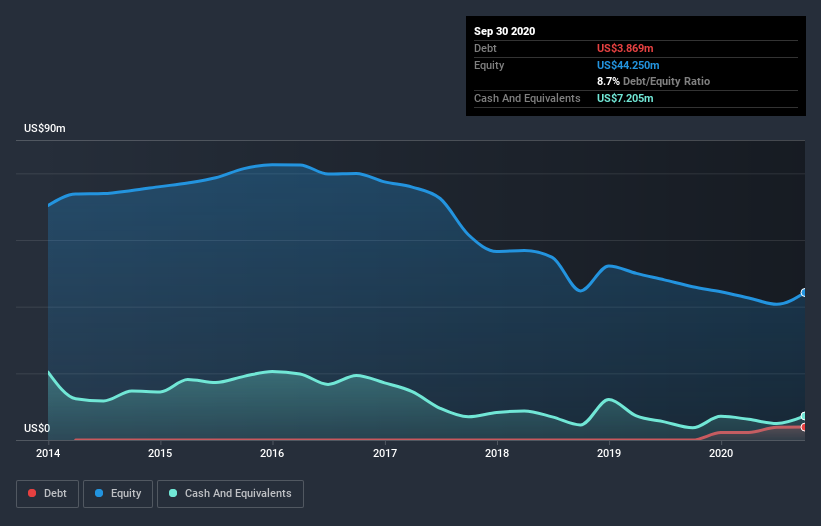
Howard Marks put it nicely when he said that, rather than worrying about share price volatility, 'The possibility of permanent loss is the risk I worry about... and every practical investor I know worries about.' So it might be obvious that you need to consider debt, when you think about how risky any given stock is, because too much debt can sink a company. As with many other companies ClearOne, Inc. (NASDAQ:CLRO) makes use of debt. But is this debt a concern to shareholders?
When Is Debt Dangerous?
Generally speaking, debt only becomes a real problem when a company can't easily pay it off, either by raising capital or with its own cash flow. In the worst case scenario, a company can go bankrupt if it cannot pay its creditors. However, a more common (but still painful) scenario is that it has to raise new equity capital at a low price, thus permanently diluting shareholders. By replacing dilution, though, debt can be an extremely good tool for businesses that need capital to invest in growth at high rates of return. When we think about a company's use of debt, we first look at cash and debt together.
Check out our latest analysis for ClearOne
What Is ClearOne's Net Debt?
You can click the graphic below for the historical numbers, but it shows that as of September 2020 ClearOne had US$3.87m of debt, an increase on none, over one year. However, its balance sheet shows it holds US$7.21m in cash, so it actually has US$3.34m net cash.

How Strong Is ClearOne's Balance Sheet?
Zooming in on the latest balance sheet data, we can see that ClearOne had liabilities of US$8.31m due within 12 months and liabilities of US$5.21m due beyond that. Offsetting this, it had US$7.21m in cash and US$6.71m in receivables that were due within 12 months. So it can boast US$388.0k more liquid assets than total liabilities.
This state of affairs indicates that ClearOne's balance sheet looks quite solid, as its total liabilities are just about equal to its liquid assets. So while it's hard to imagine that the US$49.7m company is struggling for cash, we still think it's worth monitoring its balance sheet. Simply put, the fact that ClearOne has more cash than debt is arguably a good indication that it can manage its debt safely. There's no doubt that we learn most about debt from the balance sheet. But it is ClearOne's earnings that will influence how the balance sheet holds up in the future. So when considering debt, it's definitely worth looking at the earnings trend. Click here for an interactive snapshot.
Over 12 months, ClearOne reported revenue of US$27m, which is a gain of 3.5%, although it did not report any earnings before interest and tax. We usually like to see faster growth from unprofitable companies, but each to their own.
So How Risky Is ClearOne?
By their very nature companies that are losing money are more risky than those with a long history of profitability. And the fact is that over the last twelve months ClearOne lost money at the earnings before interest and tax (EBIT) line. And over the same period it saw negative free cash outflow of US$6.2m and booked a US$7.0m accounting loss. With only US$3.34m on the balance sheet, it would appear that its going to need to raise capital again soon. Overall, its balance sheet doesn't seem overly risky, at the moment, but we're always cautious until we see the positive free cash flow. The balance sheet is clearly the area to focus on when you are analysing debt. However, not all investment risk resides within the balance sheet - far from it. Take risks, for example - ClearOne has 4 warning signs (and 1 which is potentially serious) we think you should know about.
If, after all that, you're more interested in a fast growing company with a rock-solid balance sheet, then check out our list of net cash growth stocks without delay.
When trading ClearOne or any other investment, use the platform considered by many to be the Professional's Gateway to the Worlds Market, Interactive Brokers. You get the lowest-cost* trading on stocks, options, futures, forex, bonds and funds worldwide from a single integrated account. Promoted
If you're looking to trade ClearOne, open an account with the lowest-cost platform trusted by professionals, Interactive Brokers.
With clients in over 200 countries and territories, and access to 160 markets, IBKR lets you trade stocks, options, futures, forex, bonds and funds from a single integrated account.
Enjoy no hidden fees, no account minimums, and FX conversion rates as low as 0.03%, far better than what most brokers offer.
Sponsored ContentNew: AI Stock Screener & Alerts
Our new AI Stock Screener scans the market every day to uncover opportunities.
• Dividend Powerhouses (3%+ Yield)
• Undervalued Small Caps with Insider Buying
• High growth Tech and AI Companies
Or build your own from over 50 metrics.
This article by Simply Wall St is general in nature. It does not constitute a recommendation to buy or sell any stock, and does not take account of your objectives, or your financial situation. We aim to bring you long-term focused analysis driven by fundamental data. Note that our analysis may not factor in the latest price-sensitive company announcements or qualitative material. Simply Wall St has no position in any stocks mentioned.
*Interactive Brokers Rated Lowest Cost Broker by StockBrokers.com Annual Online Review 2020
Have feedback on this article? Concerned about the content? Get in touch with us directly. Alternatively, email editorial-team@simplywallst.com.
About NasdaqCM:CLRO
ClearOne
Designs, develops, and sells conferencing, collaboration, and network streaming solutions for voice and visual communications in the United States and internationally.
Flawless balance sheet and slightly overvalued.


